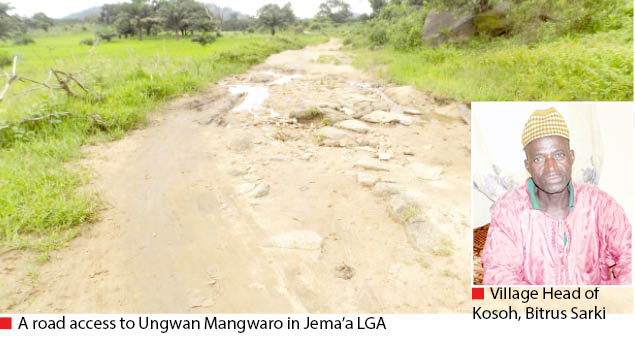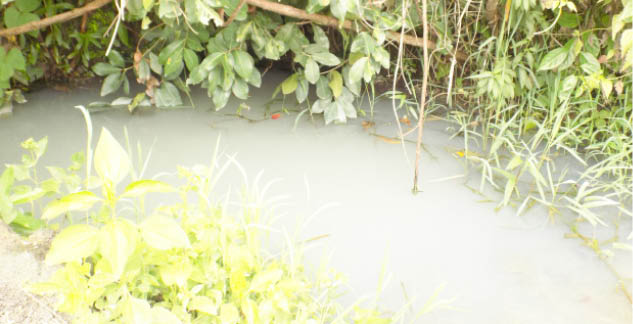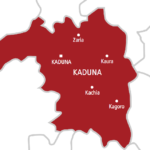In this report, Daily Trust Saturday visited three communities in Kaduna State where access to safe, drinking water has deluded citizens despite the allocation of billions of naira by the state government.
The rainy season, which starts in April annually is a symbol of hope for residents of Ungwan Mangoro, Kosoh and Madamai communities in Jema’a, Kagarko and Kaura local government areas of Kaduna State. The communities hardly get access to clean water, except during the rainy season.
Despite budgeting billions of naira in the 2022 Budget to provide safe drinking water in rural areas through the Rural Water Supply and Sanitation Agency (RUWASSA), the Kaduna State government is unable to provide clean water to several rural communities in the state.
This reporter first visited Kosoh village, a 45km journey from Kagarko town, headquarters of Kagarko LGA, where he met Godiya Mathew, a seven-month pregnant woman. The mother of three narrated with frustration, the efforts of the community to access clean water for daily use.
Her daily routine consists of getting up early to trek 2km to the stream, preparing food for the family, and getting the children ready for school before going about to make a living. “It has not been easy for children, aged women, pregnant women and nursing mothers to trek through forests looking for water,” she said.
New Naira: I’ll take a major decision in 7 days – Buhari
APC governors ask Buhari to allow new, old naira notes co-exist
“We don’t have a single borehole in our community. We have suffered a lot, and we want the government to do something for us. Please, let the government know that we have really suffered. We only see politicians during campaigns, let them come to our aid and construct boreholes for us,” she said.
Caleb Sarki, another resident, said the community has existed for more than 40 years without access to potable water. “I was born to see our parents rely on stream water for drinking,” he said.
The lack of safe water for use is one of the causes of disease and death in many rural communities in Nigeria. The situation is no different in Ungwan Mangwaro, Jema’a LGA of Kaduna State. When this reporter visited, there was no pipe-borne water. Like Kosoh, the people rely on the same stream as their animals, making the water source polluted.

Sustainable and equitable access to safe drinking water remains a challenge in Nigeria, with over 86 per cent of Nigerians lacking access to safe water, according to a 2020 UNICEF report.
In 2020, the Nigerian Government and UNICEF released a WASH NORM study which showed that while there has been some progress, more work needs to be done in the country to ensure that all Nigerians have access to adequate and quality water and hygiene services.
Although about 70 per cent of Nigerians are reported to have access to basic water supply, more than half of these water sources are contaminated. Among the 73 per cent of the country’s population that have access to water source, only nine liters of water on average is available to a Nigerian daily, according to UNICEF.
Budgetary releases for water supply
In 2022, the Kaduna State government allocated N4.7 billion for the provision of Water, Sanitation, and Hygiene (WASH) services from a budget size of N278.6bn signed by Governor Nasir Ahmad El-Rufa’i on December 22, 2021.
The budget document showed N4.7bn had been allocated to the state’s Rural Water Supply and Sanitation Agency, representing 1.7 per cent of the total budget size. Also, the budget showed that N1.5bn was earmarked for the partnership for the Expanded Water Supply, Hygiene, and Sanitation project.
The budget further captured N406.1m allocated for the implementation of the state Roadmap for Eliminating Open Defecation in 20 local government areas, while another N882.7m was allocated for the implementation of Sustainable Urban-Rural Water, Sanitation, and Hygiene across the state.
A total of N214.5m had been earmarked for the procurement of three state-of-the-art drilling rigs and accessories, and N16.8m for an emergency response to the disaster in WASH.
The state also allocated N72.9m for the Village Level Operation and Maintenance concept in 476 communities for the sustainability of WASH facilities, even though many rural communities are without water supply to date.
Apart from government allocations, many international organizations have made interventions to improve water accessibility in rural and urban areas of the state. One of such interventions is the Sustainable Urban and Rural Water Supply, Sanitation and Hygiene (SURWASH) services in the state.
The World Bank also approved a $700m programme for SURWASH in seven states, including Kaduna, since 2017.
Right to clean water is for all
In 2010, the United Nations General Assembly, in a resolution, explicitly recognized the human rights to water and sanitation. Everyone has the right to sufficient, continuous, safe, acceptable, physically accessible and affordable water for personal and domestic use. This has been affirmed by the SDG 6.1 which calls for full coverage of safely managed drinking water by 2030.
Accessing potable water, however, poses a herculean task in many rural communities across Nigeria, hence communities where there are no boreholes and wells resort to streams and other unhygienic sources of water to meet their needs. The situation is more pronounced in slums and impoverished rural areas.
The World Bank reported in 2021 that 60 million Nigerians are without access to basic drinking water and 80 million people are without improved sanitation facilities.
Only a handful communities in some of the rural settlements visited by this reporter are often served via a network of boreholes and mono-pump water schemes, constructed either by legislators, individuals or NGOs. Majority rely on streams, often contaminated by animal and human wastes.
Water scarcity causes disease and death – Expert
Researchers have found that water scarcity is associated with diseases. Dr Abubakar Sadik Idris, from the Department of Public Health Kaduna State Ministry of Health, listed Diarrhea, Typhoid, Hepatitis A, Cholera, Scabies, Schistosomiasis and others as water related diseases.
He said water related diseases, caused by unavailability of safe drinking water and the absence of proper sanitation facilities, are among the leading causes of death in the developing world.
He says cholera, an acute diarrhoeal infection caused by ingestion of food or water that has been contaminated with the bacterium Vibrio Cholerae continues to be a global threat to public health.
According to the World Health Organization (WHO), an estimated 1.3 to 4.0 million cases of Cholera, and 21,000 to 143,000 deaths occur worldwide as a result of Cholera.
“Cholera is a highly virulent infection that can cause severe acute watery diarrhoea which can lead to death within hours if left untreated,” Dr. Idris said. He added that the transmission of Cholera is closely associated with inadequate access to clean water and sanitation facilities.
Second to Cholera is Diarrheal disease, which Dr. Sadik says is usually spread through the consumption of contaminated food or water or from person to person due to poor hygiene. “And it can be prevented through safe drinking water, improved sanitation and personal hygiene, especially hand washing with soap and water,” he added.
He explained that Typhoid fever, which is also transmitted through contaminated food or water, is a life-threatening infection caused by the bacterium Salmonella Typhi.
WHO estimated that 7,134 persons died worldwide from Hepatitis A in 2016. Dr. Sadik says Hepatitis A infection is higher in countries with inadequate availability of potable water supply, poor sanitary conditions and hygiene practices.
Water scarcity is a global problem, with the UNICEF stating that almost two thirds (4 billion) of the world’s population experience severe water scarcity for at least one month each year and that half of the world’s population could be living in areas facing water scarcity by 2025.
It added that some 700 million people could be displaced by intense water scarcity by 2030 and by 2040, roughly 1 in 4 children worldwide will be living in areas of extremely high scarcity of clean potable water.
“But with all these dangers and warnings, our government and our elected politicians have neglected us for decades without any effort to ameliorate our sufferings,” says Bitrus Sarki, village head of Kosoh community of Kagarko LGA.
According to Sarki, children from the community, especially, suffer and die from water-borne diseases. “We don’t have a standard health facility to care for our children during emergency. There is not a single borehole in this community, hence we resorted to streams and ponds.”
He said the only mono-borehole that was constructed by an individual is no longer functional. “Imagine a community of 3000 people with no single borehole.”
“We have many cases here. We built a clinic without government intervention but it is yet to be completed. We also have only two classes with two teachers for the whole community at primary school level. The only road that links our village to Kubacha via Kukui is bad. We feel totally abandoned, but still, the politicians come to our community to campaign during election season soliciting for our votes,” he said.
For those who can afford a better source of water for drinking, Caleb Bitrus says he spends N2,500 every four days to buy sachets of ‘pure water’. “This is because I am single. But we have some residents who spend between N3000 and N4000 to get water for large domestic use. Those who can afford it are few,” he said.
Kaduna-RUWASSA, which is responsible for providing water in rural areas, did not comment on this report.
This reporter contacted the Director General of Kaduna RUWASSA, Mubarak Shehu Ladan, but he did not respond to the WhatsApp message sent to him and also did not answer calls to his phone.
This report was facilitated by the Wole Soyinka Centre for Investigative Journalism (WSCIJ) under its Collaborative Media Engagement for Development, Inclusion and Accountability (CMEDIA) project.

 Join Daily Trust WhatsApp Community For Quick Access To News and Happenings Around You.
Join Daily Trust WhatsApp Community For Quick Access To News and Happenings Around You.


